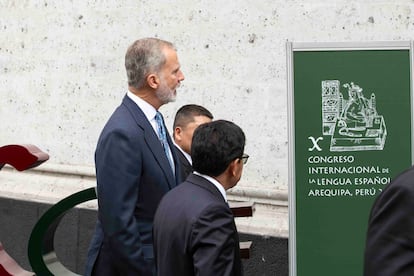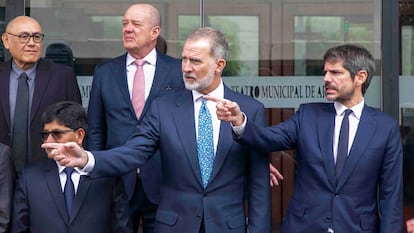The King of Spain, Felipe VI, has assured, in the opening session of the At the Municipal Theater of Arequipa, the King added that this congress is “a valuable lesson in times when we constantly hear about competition, rivalry, disconnection, the resurgence of blocs… of interests and not cooperation.” Some words with special meaning in a few days in which the confrontation between the director of the Cervantes Institute, Luis García Montero, and the director of the Royal Spanish Academy (RAE), Santiago Muñoz Machado, has been shown in all crudeness.
Don Felipe has referred precisely in his speech to these institutions that have collided, in what can be interpreted as a call for understanding. “The CILE is a great sounding board thanks to the tireless work and cooperation of several institutions of great value and prestige: the Cervantes Institute, the Royal Spanish Academy and the Association of Academies of the Spanish Language (Asale), and also thanks to the authorities and institutions of Peru.”
The King wanted to emphasize that this congress has been “the fruit of intense and meticulous preparation, of a firm will to bring it to Arequipa, honoring the manifest wish in life of one of the greatest narrators and essayists who have given our literature, Mario Vargas Llosa”, born in the so-called white city. He also recalled that he and Queen Letizia were in Arequipa “then as princes, during an official visit to Peru.” “The indelible memories of that occasion reverberate strongly today as we gather around this intangible heritage that we share: language.”
Regarding miscegenation, one of the thematic axes of the congress, he added: “No language was born to be a barrier or wall; and if they have ever been, it is because they have been made to follow a wrong path, which denatures their primary function: to communicate.” Regarding another issue discussed in this CILE, artificial intelligence, he has defended the role of Spanish in this technological revolution. “Let’s continue working together so that AI is also nourished by Spanish, and from sources that help preserve the quality, correctness and unity, within the diversity, of the language.” And of the third, clear language, he highlighted: “In these hectic times, of immediate and not always truthful information, we must insist on proximity, simplicity and transparency.”
Hours before the solemn inauguration in Arequipa, the writer and academic of the RAE, Arturo Pérez-Reverte, has fueled the clash between García Montero and Muñoz Machado. Pérez-Reverte has charged very harshly against the director of Cervantes, whom in his account on the social network
That other person the writer refers to is the Minister of Foreign Affairs, European Union and Cooperation, José Manuel Albares, whose department Cervantes depends on. “The incompetence of successive Foreign Ministers, especially the last one, has made us lose Hispanic America. The only link of diplomatic prestige that is still maintained with it, thanks to the RAE, is the Spanish language,” he wrote. “Exteriors, through its mediocre and conniving director Cervantes (creature of Albares) intends to get his hands there too; colonize the natural environment of the RAE, elbowing his way to star in photography.”
Finally, Pérez-Reverte has given his opinion on García Montero’s statements at the CILE presentation press conference, in which he revealed that Muñoz Machado was preparing a cover-up to succeed him. For the writer, what he seeks is to “also control the Academy, if he is allowed to do so.” “In other words, putting it at their service and contaminating it as they have done with all Spanish institutions. Which translates, in the case at hand, into a sinister mix of scrambled egos and bad faith.”
Pérez-Reverte’s words are, for now, the new chapter of this contest, which, thus, has barely experienced a few hours of truce since the press conference to present the congress on Monday.
In addition, the Spanish Royal Academy of Moral and Political Sciences, of which Muñoz Machado is a member, published a statement on Tuesday in which it “unanimously” agreed to “express its support” to the RAE “in relation to the management of its director in the face of unjustified and misplaced criticism.”

Back at the Municipal Theater of Arequipa, García Montero opened the event alongside Carmen Noguero, general secretary of Cervantes, in a speech in which he highlighted that we must raise our voices “against genocide.” The director of Cervantes recalled that it was Vargas Llosa, at the CILE in Córdoba (Argentina), in 2019, who asked him for his opinion on whether it was a good idea to propose at the closing that Arequipa host an upcoming congress. “If you say so, there is no turning back,” García Montero then told him. The event, scheduled for 2022, had to first be postponed and later canceled due to the turbulent political situation in the country. Now that it is finally celebrated, the Andean country is experiencing a new moment of instability after the dismissal last week of President Dina Boluarte by Congress.
The writer Javier Cercas, columnist of The Weekly Countryhighlighted in his speech “the substance” of the three thematic axes of CILE: miscegenation, clear language and artificial intelligence. Regarding this last aspect, he highlighted: “It must be used for good, not for evil, and that control depends on us.” He then carried out a fiery defense of Spanish, “the main source of wealth for Spanish speakers.” However, he asked himself: “Are politicians aware of this? I don’t see that they are doing everything they can to make it prosper. Are they willing? That is the real question for me, beyond the clichés about Spanish.” A speech that has been highly applauded.
Praise for miscegenation
For his part, Muñoz Machado has praised miscegenation and has highlighted some aspects of the Spanish conquest. In a country like Peru, he stressed that “the Spanish language receives the daily contribution of indigenous languages.”
The Colombian author Juan Gabriel Vásquez has emphasized that we are in a time in which “the violent have stained our time with blood and honor, in Gaza, in Ukraine, in the harassment of migrants from around the world.”
The event also included the words of the Peruvian writers Giovanna Pollarolo and Oswaldo Chanove, as well as the secretary general of the Ministry of Foreign Affairs of Peru, Eric Anderson Machado. Finally, the King’s intervention, whose final point was to quote Vargas Llosa: “Life is wonderful because it has an end,” said the Nobel Prize winner in Literature. For the King, it is “a beautiful phrase in its polysemy: end speaks to us about the conclusion of a life cycle and end is also purpose: the objective towards which we must direct our actions so that they have meaning.”

